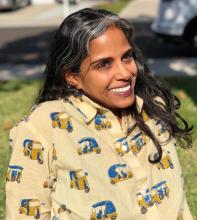In Ghana recently, I became friends with Hasan, a man who ran a small business near where I stayed. For the first few days when I'd walk by, we'd greet each other silently with nods as proximally related strangers often do. One day after hearing me talk with someone, he waved me toward his stall. "You speak English very well," he said admiringly. "Tell me from where you come." I replied, "I live in America.” He thought for a moment, and then said, "Yes, you live in a rich land.” A few moments later, he repeated this statement, and added, “but you are like us Ghana people. You're not an obruni (foreigner)." I laughed and told him it was my first time in his country and I had much to learn, so indeed I was an obruni. Hasan pointed to my brown arm and face and black hair and said, “No. This makes you more like us.”
Over the next two weeks, I found our conversations both fascinating and vexing, for though my Indian origins coded me differently than white people in Hasan’s eyes, his experiences as a working class rural Ghanaian who had migrated to the city for basic opportunity looked incredibly different than my extremely privileged, opportunity-rich life in Seattle. He continued to insist that we were more alike than different, and my squeamishness at all that I have and am made me vociferously insist that we were not. We both were right, and we both were wrong.
Travel (as both a metaphor and as a thing we do) holds a lot of power and potential, right? I love the work I get to do with students as I help them sort these ideas out. I'm curious about how history plays out in our present, and what we do together to create change and opportunity for more of the people around us. My new book Beyond Guilt Trips: Mindful Travel in an Unequal World explores moments like this when we seek connections with others and are simultaneously positioned far apart because of our various advantages and global identities.
Since we’re always traveling in different ways, I think we could benefit from paying attention to what we see and how it makes us feel. We travel through different neighborhoods of our city and witness the ways that life is either easier or more difficult for some. We travel through different political discourses and struggle to clarify our own values. And sometimes, even, we board planes to experience life and culture differently than we know it. When you or I travel in any of these ways, the experience can either reinforce what we already know or nudge us to rethink our assumptions. Sometimes it feels great to expand and stretch. And sometimes, not so much.
I suppose in many ways, we're all on different journeys with different kinds of baggage. Traveling mindfully in an unequal world gives us the opportunity to acknowledge where we come from and the different ways we experience the world. Hopefully, too, it gives us a framework to practice actually connecting with one another in honest ways amidst all our differences. And when you think about it, who among us wouldn't benefit from a few more authentic connections? Though I can’t pretend that my life experiences overlap with Hasan’s, I do know that our budding friendship that began at his shop counter and continues now on WhatsApp helps me sort some big ideas out in small and sweet ways.
Listen to Dr. Anu Taranath talk about her book on KUOW.
